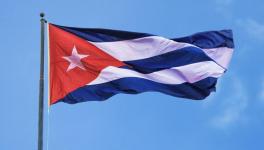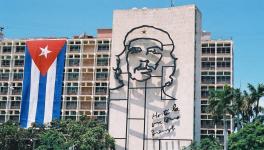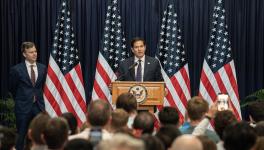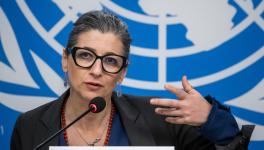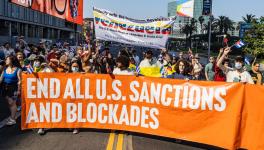Drop Blockade Imposed by US, Cuba Says in Resolution Submitted to UNGA
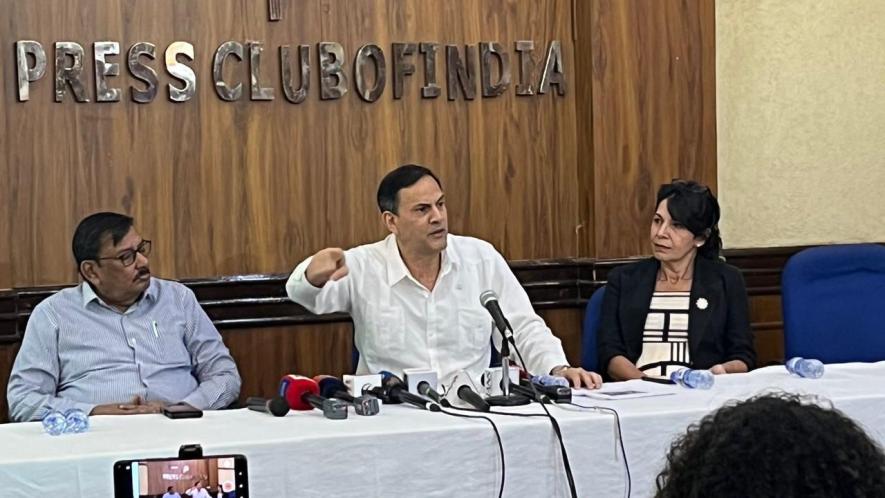
Cuba’s Ambassador to India, Juan Carlos Marsan Aguilera, addressing a press conference at the Press Club of India in New Delhi on Thursday, October 23, 2025. Image credit: Newsclick
New Delhi: For the 33rd time, the UN General Assembly on October 28-29, 2025, is slated to consider Cuba’s resolution on the impact of the US blockade on the Cuban people, calling for an immediate end to it.
At a press conference held at the Press Club of India here on Thursday, Cuba’s Ambassador to India, Juan Carlos Marsan Aguilera, said he hoped that India, as a long-standing friend of Cuba, would once again stand with the people of Cuba and vote in support.
“Last year, 183 countries supported our resolution. Only the US and Israel opposed and Abu Dhabi abstained,” he said.
Presenting the resolution at the press conference, the Ambassador described how US economic, commercial and financial blockade, imposed for 65 years, was an outcome of a policy of “extraterritorial scope motivated by political reasons” that had resulted as the main obstacle for the development of Cuba.
The resolution pointed out, citing statements made by the US Secretary of State, that it confirmed America’s intention to “to cut off all possible sources of external income for Cuba.”
The resolution added that the US policy was aimed at “harming tourism and travel by Americans and from other countries, sabotage international medical collaboration and fuel supplies, obstruct the flow of family remittances and intimidate foreign direct investment and trade, and disrupt Cuba’s economic and cooperative relations with third countries.”
The Ambassador said the US blockade was a retaliation against the country after the Cuban Revolution, as before that almost 70% land was in the hands of US companies.
The resolution termed the inclusion of Cuba in the list of countries “sponsoring terrorism’ as “dishonest and politically motivated”.
Incidentally, 10 days before US President Joe Biden left office, Cuba had been removed from the list of countries “sponsoring terrorism”, but Donald Trump revoked the decision.
Citing immense hardships being faced by the people of Cuba, especially trade, business, children and sick people, the resolution pointed out that many banks, following the US blockade, had suspended their operations with Cuba, including transfers for the purchase of food, medicines, fuel etc.
While all the problems facing the Cuban people are exclusively due to the US government's blockade, but, this policy and its cumulative effects represent the main obstacle to Cuba's development, said the resolution.
Outlining the severe impact of the blockade on Cuba’s economy and its people, the resolution said:
“The cost of 2 months of blockade is equivalent to the financing needed to guarantee the delivery of the rationed family food basket to the population during one year (around USD 1,600,000,000).
The cost of 4 months of blockade is equivalent to the financing required to purchase the buses needed by the public transportation system in the country
(USD 2,850,000,000).
The cost of 16 days of blockade is equivalent to the financing required to meet the needs of the country's National List of Essential Medicines (around USD 339,000,000).”
While recognising and expressing gratitude to the international community’s “almost unanimous” support for Cuba’s efforts to end the blockade, the Ambassador said that the country hoped that once again it could count on the overwhelming majority of countries, including India, as in the last 32 years, to vote in favour of the Cuban draft resolution in the UNGA.
Get the latest reports & analysis with people's perspective on Protests, movements & deep analytical videos, discussions of the current affairs in your Telegram app. Subscribe to NewsClick's Telegram channel & get Real-Time updates on stories, as they get published on our website.











